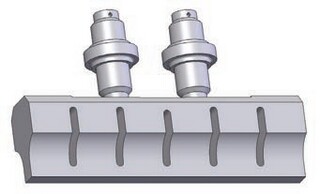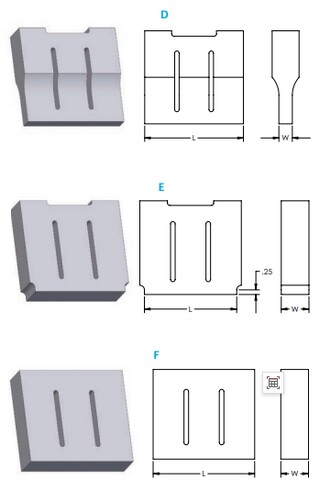BRANSON Uitrasonic horn

Materials
Horns are made ofmaterials which have a good combination ofacoustical and mechanical properties, Titanium has the bestacoustical properties ofthe high strength alloys and its high fatiguestrength enables it to withstand high cycle rates at high amplitudesIt also has a higher hardness than aluminum and therefore holds upbetter aqainst wear. Branson utilizes Titanium 7-4 to fabricate mostofthe catalog horns. This higher end grade of titanium is roughly15% stronger than the more common Titanium 6-4 grade, allowingit to withstand higher stresses. As such, higher amplitude can beachieved with horns made out of 7-4.
Titanium horns can be carbide-coated for added wear resistancewhen welding abrasive materials containing glass or talc. They canalso be nitride-coated when lubricity is desired (namely in foodprocessing applications). Horns made out of titanium are typicallymore expensive than other materials due to the higher cost ofthematerial and machining time.
Aluminum heat-treated alloy has excellent acoustical properties andis used to make horns not requiring high amplitude, strength orhardness. Aluminum horns can be chrome-plated to help preventpart marking. They can also be clear-anodized to prevent transferringaluminum oxide to the parts.
Information such as coating thickness, typical application andhardness can be found on Branson's Technolog TL-19. Also, to reacmore about the advantages ofTitanium 7-4 or 6-4, please refer toTL-18. These documents can be found on website:www.bndcsb.com
Horns made of alloy steel can be heat-treated for a wear-resistantsurface, but the low acoustical efficiency ofsteel limits its use tohorns for low amplitude applications such as insertion.
Materials
Horns are made ofmaterials which have a good combination ofacoustical and mechanical properties, Titanium has the bestacoustical properties ofthe high strength alloys and its high fatiguestrength enables it to withstand high cycle rates at high amplitudesIt also has a higher hardness than aluminum and therefore holds upbetter aqainst wear. Branson utilizes Titanium 7-4 to fabricate mostofthe catalog horns. This higher end grade of titanium is roughly15% stronger than the more common Titanium 6-4 grade, allowingit to withstand higher stresses. As such, higher amplitude can beachieved with horns made out of 7-4.
Titanium horns can be carbide-coated for added wear resistancewhen welding abrasive materials containing glass or talc. They canalso be nitride-coated when lubricity is desired (namely in foodprocessing applications). Horns made out of titanium are typicallymore expensive than other materials due to the higher cost ofthematerial and machining time.
Aluminum heat-treated alloy has excellent acoustical properties andis used to make horns not requiring high amplitude, strength orhardness. Aluminum horns can be chrome-plated to help preventpart marking. They can also be clear-anodized to prevent transferringaluminum oxide to the parts.
Horns made of alloy steel can be heat-treated for a wear-resistantsurface, but the low acoustical efficiency ofsteel limits its use tohorns for low amplitude applications such as insertion.





